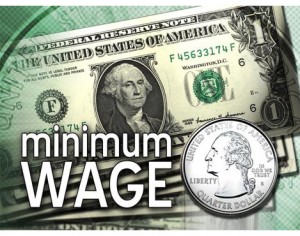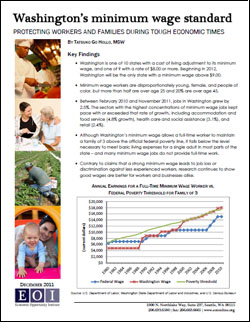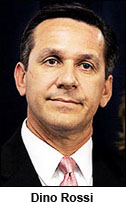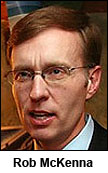STATE GOVERNMENT
Attacks on minimum wage are back in 2012
By David Groves
The Stand
 Washington just earned national notoriety for being the first state with a minimum wage above $9 an hour. With the latest inflationary increase, as required under a voter-approved state law, the lowest legal wage in 2012 is now $9.04 an hour.
Washington just earned national notoriety for being the first state with a minimum wage above $9 an hour. With the latest inflationary increase, as required under a voter-approved state law, the lowest legal wage in 2012 is now $9.04 an hour.
This year’s 37-cent increase is good news for an estimated 194,000 minimum-wage workers in Washington and another 87,000 who earn near that and are indirectly affected, according to an analysis by the Washington, D.C.-based Economic Policy Institute.
“They’re just increasing the minimum wage so I can continue to live,” 23-year-old Sarah Becker told the Kitsap Sun. She has worked full time at a Silverdale cafe for the past two years at the minimum wage.
Advocates for working families — and many economists — say it’s also great news for the struggling local economies and businesses where those higher wages will be spent in our consumer-driven economy.
“At least these low-wage earners will maintain their purchasing power and go purchase things,” said Washington State Labor Council President Jeff Johnson, who authored 1998’s minimum wage initiative, in an interview with Huffington Post. “The money will go right back into the economy.”
But corporate lobbying groups adamantly oppose Washington’s higher minimum wage. They say it costs jobs, particularly for teenagers, because businesses can’t afford to hire as many people. Every year, conservative lawmakers in Olympia propose measures to slow or stop the minimum wage from increasing. And the 2012 legislative session that begins Monday, Jan. 9 will be no exception.
“Protecting Workers During Tough Economic Times”
 A new study of the impact of Washington’s minimum wage refutes the job-loss argument and the myth that minimum-wage workers are mostly teenagers just starting out in the workforce. The Economic Opportunity Institute study released in December found:
A new study of the impact of Washington’s minimum wage refutes the job-loss argument and the myth that minimum-wage workers are mostly teenagers just starting out in the workforce. The Economic Opportunity Institute study released in December found:
- Between February 2010 and November 2011, jobs in Washington grew by 2.5%. The sectors with the highest concentrations of minimum-wage jobs kept pace with or exceeded that rate of growth, including accommodations and food service (4.8% growth), health care and social assistance (3.1%), and retail (2.4%).
- More than half of all minimum-wage workers are over the age of 25, and 20% are over 45. They are disproportionately women and people of color. About one-fourth of workers who are impacted by minimum wage increases are parents with children at home.
- Although Washington’s minimum wage allows a full-time worker to maintain a family of three slightly above the official federal poverty line, it falls below the level necessary to meet basic living expenses for a single adult in most parts of Washington State. If a minimum-wage worker at $9.04 an hour is fortunate enough to work full time (many aren’t), that worker will earn just $18,000 this year.
But the most compelling argument in favor of higher minimum wages may be this — it is what the people want. The 1998 initiative that made Washington the first state to “index” its minimum wage to inflation passed with a two-thirds majority. Seven other states have since followed suit. The Washington initiative’s campaign had a simple message: “Full-time workers should not be forced to live in poverty.” That message resonated strongly with voters.
As economists Dean Baker and John Schmitt point out in an opinion column that appears this week at Salon.com:
Despite criticisms from vocal business opponents, polls consistently show that Democrats, Independents and Republicans all voice support for the minimum wage. This makes sense. Higher minimum wages are about rewarding work and making it possible for workers to earn enough to support a family, with a minimum of government bureaucracy.
Right-wing conservatives will try again in 2012
Despite its popularity, right-wing conservatives in Olympia plan to try again this year to lower Washington’s lowest legal wage.
State Rep. Cary Condotta (R-Wenatchee) predicts that the minimum wage may be one of the big issues of the legislative session that begins on Jan. 9. And he says he plans to push a bill that would allow employers to pay a “training wage” to new hires during their first few months of employment.
 That “training wage” idea was championed by Republican gubernatorial candidate Dino Rossi in 2008. Some political observers have said it cost him the election.
That “training wage” idea was championed by Republican gubernatorial candidate Dino Rossi in 2008. Some political observers have said it cost him the election.
Rossi floated the idea of lowering the minimum wage for new hires during a business-sponsored debate about a month before Election Day 2008, at a time when he and incumbent Democratic Gov. Chris Gregoire were running neck-and-neck in the polls. Gregoire’s campaign pounced and began running TV ads attacking Rossi’s attempt to lower the minimum wage. In October, polls gradually showed Gregoire pulling ahead and she eventually won by a relatively comfortable 195,000-vote margin (6.5%), compared to her disputed 133-vote victory over Rossi in 2004.
Right-wing Republicans from Eastern Washington, who are safely re-elected term after term, aren’t likely to fear a voter backlash for their efforts to lower our lowest legal wage. But Rossi’s 2008 experience suggests that conservatives hoping to portray themselves as “moderates” to get elected to statewide office should avoid the issue’s political peril.
 Republican Attorney General Rob McKenna, who is running for governor in 2012, is such a candidate. But apparently he didn’t get that memo.
Republican Attorney General Rob McKenna, who is running for governor in 2012, is such a candidate. But apparently he didn’t get that memo.
Although its his job to enforce Washington laws, he sought to block a minimum wage wage increase last year with a creative interpretation of the law that would have denied the annual increase in certain years. A Superior Court judge summarily rejected a business-funded lawsuit attempting to impose McKenna’s reinterpretation of the law, and the minimum wage went up as scheduled.
The people of Washington may have thought they had finally taken the politics out of this issue when they made Washington the first state to automatically adjust its minimum wage. But the right-wing advocates of corporate lobbying groups seem determined (again) to put the politics back in 2012.





